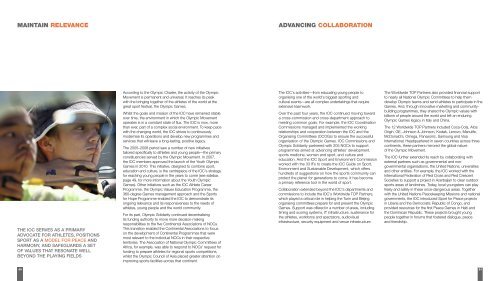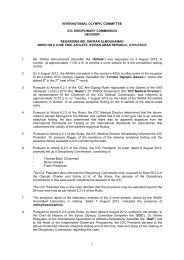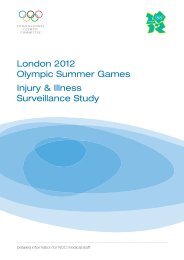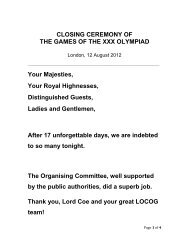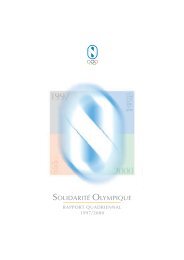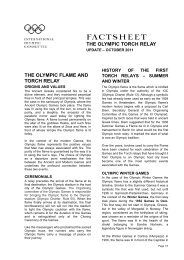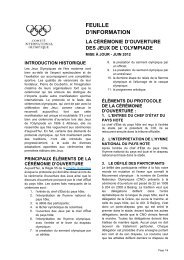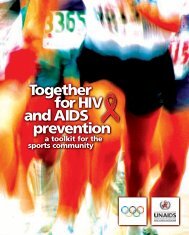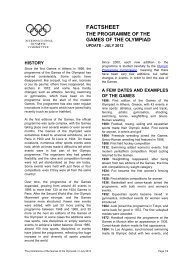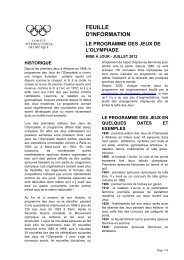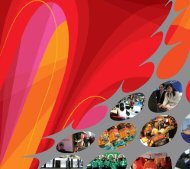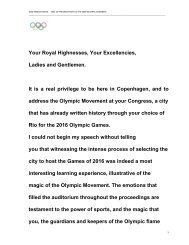3912 reportcomplete final web:layout 1
3912 reportcomplete final web:layout 1
3912 reportcomplete final web:layout 1
Create successful ePaper yourself
Turn your PDF publications into a flip-book with our unique Google optimized e-Paper software.
MAINTAIN RELEVANCE<br />
THE IOC SERVES AS A PRIMARY<br />
ADVOCATE FOR ATHLETES, POSITIONS<br />
SPORT AS A MODEL FOR PEACE AND<br />
HARMONY, AND SAFEGUARDS A SET<br />
OF VALUES THAT RESONATE WELL<br />
BEYOND THE PLAYING FIELDS<br />
20<br />
According to the Olympic Charter, the activity of the Olympic<br />
Movement is permanent and universal. It reaches its peak<br />
with the bringing together of the athletes of the world at the<br />
great sport festival, the Olympic Games.<br />
Whilst the goals and mission of the IOC have remained stable<br />
over time, the environment in which the Olympic Movement<br />
operates is in a constant state of flux. The IOC is now, more<br />
than ever, part of a complex social environment. To keep pace<br />
with the changing world, the IOC strives to continuously<br />
modernise its operations and develop new programmes and<br />
services that will leave a long-lasting, positive legacy.<br />
The 2005–2008 period saw a number of new initiatives<br />
tailored specifically to athletes and young people—the primary<br />
constituencies served by the Olympic Movement. In 2007,<br />
the IOC members approved the launch of the Youth Olympic<br />
Games in 2010. This initiative, designed to combine sport,<br />
education and culture, is the centrepiece of the IOC’s strategy<br />
for reaching young people in the years to come (see sidebar,<br />
page 49, for more information about the Youth Olympic<br />
Games). Other initiatives such as the IOC Athlete Career<br />
Programme, the Olympic Values Education Programme, the<br />
360-degree Games management approach and the Sports<br />
for Hope Programme enabled the IOC to demonstrate its<br />
ongoing relevance and its responsiveness to the needs of<br />
athletes, young people and the world community.<br />
For its part, Olympic Solidarity continued decentralising<br />
its funding authority to move more decision-making<br />
responsibilities to the five Continental Associations of NOCs.<br />
This transition enabled the Continental Associations to focus<br />
on the development of Continental Programmes that were<br />
most relevant to the individual NOCs in their respective<br />
territories. The Association of National Olympic Committees of<br />
Africa, for example, was able to respond to NOCs’ request for<br />
funding to prepare athletes for regional sports competitions,<br />
whilst the Olympic Council of Asia placed greater attention on<br />
improving sports facilities across that continent.<br />
ADVANCING COLLABORATION<br />
The IOC’s activities—from educating young people to<br />
organising one of the world’s biggest sporting and<br />
cultural events—are all complex undertakings that require<br />
extensive teamwork.<br />
Over the past four years, the IOC continued moving toward<br />
a cross-commission and cross-department approach to<br />
meeting common goals. For example, the IOC Coordination<br />
Commissions managed and implemented the working<br />
relationships and cooperation between the IOC and the<br />
Organising Committees (OCOGs) to ensure the successful<br />
organisation of the Olympic Games. IOC Commissions and<br />
Olympic Solidarity partnered with 205 NOCs to support<br />
programmes aimed at advancing athletes’ development,<br />
sports medicine, women and sport, and culture and<br />
education. And the IOC Sport and Environment Commission<br />
worked with the 33 IFs to create the IOC Guide on Sport,<br />
Environment and Sustainable Development, which offers<br />
hundreds of suggestions on how the sports community can<br />
protect the planet for generations to come. It has become<br />
a primary reference tool in the world of sport.<br />
Collaboration extended beyond the IOC’s departments and<br />
commissions to include the IOC’s Worldwide TOP Partners,<br />
which played a critical role in helping the Turin and Beijing<br />
organising committees prepare for and present the Olympic<br />
Games. Support was offered in a number of areas, including<br />
timing and scoring systems, IT infrastructure, sustenance for<br />
the athletes, workforce and spectators, audiovisual<br />
infrastructure, security equipment and venue infrastructure.<br />
The Worldwide TOP Partners also provided financial support<br />
to nearly all National Olympic Committees to help them<br />
develop Olympic teams and send athletes to participate in the<br />
Games. And, through innovative marketing and communitybuilding<br />
programmes, they shared the Olympic values with<br />
billions of people around the world and left an enduring<br />
Olympic Games legacy in Italy and China.<br />
The 12 Worldwide TOP Partners included Coca-Cola, Atos<br />
Origin, GE, Johnson & Johnson, Kodak, Lenovo, Manulife,<br />
McDonald’s, Omega, Panasonic, Samsung and Visa<br />
International. Headquartered in seven countries across three<br />
continents, these partners mirrored the global nature<br />
of the Olympic Movement.<br />
The IOC further extended its reach by collaborating with<br />
external partners such as governmental and nongovernmental<br />
organisations, the United Nations, universities<br />
and other entities. For example, the IOC worked with the<br />
International Federation of Red Cross and Red Crescent<br />
Societies to support a project in Azerbaijan to clear outdoor<br />
sports areas of landmines. Today, local youngsters can play<br />
freely and safely in these once-dangerous areas. Together<br />
with the United Nations Peacekeeping Missions and national<br />
governments, the IOC introduced Sport for Peace projects<br />
in Liberia and the Democratic Republic of Congo, and<br />
provided resources for the first Peace Games in Haiti and<br />
the Dominican Republic. These projects brought young<br />
people together in forums that fostered dialogue, peace<br />
and friendship.<br />
21


